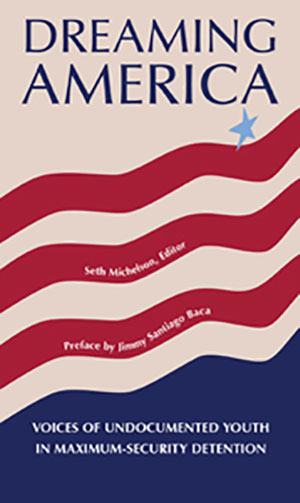Dreaming America: Voices of Undocumented Youth in Maximum-Security Detention. Edited by Seth Michelson. Silver Spring: Settlement House. 2017. 110 pages.
 It is a sad truth of our society that certain forms of language speak louder than others, such that certain voices remain inaudible no matter how important their words may be. Dreaming America: Voices of Undocumented Youth in Maximum-Security Detention seeks to remedy this injustice by sharing, in Spanish and English, the words of unaccompanied children held in maximum-security detention by the US Office of Refugee Resettlement. Through forty-one poems that reflect on past traumas, present struggles, and future ambitions, the collection offers a simultaneously tragic and hopeful glimpse into the lives of young people who find themselves out of place, asking only to be given a chance in a country that many idealize, even from behind bars.
It is a sad truth of our society that certain forms of language speak louder than others, such that certain voices remain inaudible no matter how important their words may be. Dreaming America: Voices of Undocumented Youth in Maximum-Security Detention seeks to remedy this injustice by sharing, in Spanish and English, the words of unaccompanied children held in maximum-security detention by the US Office of Refugee Resettlement. Through forty-one poems that reflect on past traumas, present struggles, and future ambitions, the collection offers a simultaneously tragic and hopeful glimpse into the lives of young people who find themselves out of place, asking only to be given a chance in a country that many idealize, even from behind bars.
The story behind Dreaming America is almost as compelling as its poems. The book’s young authors, some of whom are illiterate, participated in poetry workshops directed by editor Seth Michelson, learning, in the words of one young writer, that poetry can be “a way of freeing yourself from the chains that tie you to harsh reality.” The poems were translated collaboratively by undergraduate students at Washington & Lee University, creating a bilingual collection that is deeply moving in both languages. Readers will notice, however, that neither the names of the authors nor those of the translators appear in the book: as Seth Michelson explains in an interview for WLT’s blog, US law prevented the publication of the authors’ names. For this reason, the collection carries the sad weight of anonymity; even when their words can finally be heard, the identities of these brave poets cannot be revealed.
Nonetheless, Dreaming America sets an important precedent for the inclusion of silenced voices in the literary discourse and immigration rhetoric of the United States. Armed with poetry, these young immigrants speak up in a register that would normally be out of their reach. Whether they use poetry to imagine how their family dog will start “jumping like crazy” when they see him again or to “show Donald Trump / that Latinos have heart,” the authors of Dreaming America make a mark on an unjust reality through the power of language. Likewise, Dreaming America will leave a permanent mark on its readers, reminding us to listen to the voices that deserve our attention, even when barriers both social and physical make them difficult to hear.
Arthur Dixon
University of Oklahoma





